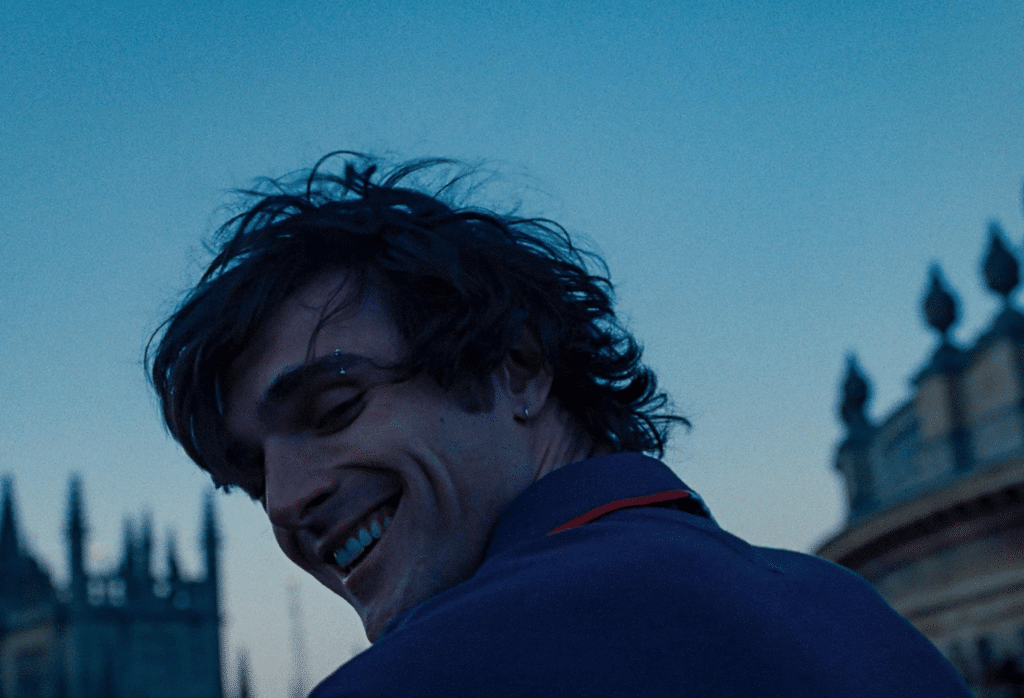The stakes were high for writer director Emerald Fennell after the success of her feature debut “Promising Young Woman”, released almost three years ago to a global consensus of nodding women.
“Me too,” many of us were telling each other. “This is exactly what it feels like to live inside a female body.”
What movie will she make next, we all wondered.
‘Saltburn’ is the answer — a two hour and seven minute ogling fest of beautiful male bodies inside the aristocratic walls of Oxford and British old money.
Our two male leads are Jacob Elordi, the Australian ‘babygirl’ (TikTok speak for total hunk) and Barry Keoghan, the Irish actor known for his brilliant screen presence in movies such as “The Killing of a Sacred Deer”, “Dunkirk” and “The Banshee of Inisherin.” (He is also known for his unusual looks).
The story kicks off in Oxford, where Elordi plays Felix, the guy every boy wants to be and every girl wants to hook up with. Keoghan’s Oliver is a placeholder (at least in the first half of the movie) for the audience — we are all watching Felix from afar, admiring his height (Elordi is over 6’4″) his beauty, and his endless posse of friends. Everyone who looks at Jacob literally needs to peer up at him, as if looking at a deity.
We all knew a Felix back at uni. He was the guy who seemed to have it all — good looks, wealth, and an effortless charisma that seemed to draw everyone into his orbit.
And yet we were all more like Oliver — the outsider who hoped that one day, the object of our desire might land their gaze upon us. Oliver is a scholarship boy who buys his clothes from Oxfam. He’s a sort of genius, but because he lacks sexual currency, we feel his isolation and loneliness. Few things in life are more painful than the burn of not fitting in.
When Oliver opens up to Felix about a family tragedy, Felix invites him to stay at his family’s estate over one summer. Thirty minutes into the movie, we finally see the titular character of the movie for the first time — not unlike Mr Darcy’s Pemberley.
“I’m sorry everything here is so old fashion “ Felix says to Oliver, which is another way of saying ‘I’m sorry this place is so ludicrously rich and unfamiliar to you.’
For the rest of the movie, we watch as our anti-hero carves his way through the maze of wealth, prestige and black-tie dinners (Felix’s family insist the men cufflinks to dinner every night).
We experience Oliver’s dreamy crush on Felix, a crush that very quickly turns into a sexual craze fuelled by obsession.
The movie is a voyeuristic fantasy of male libidinal desire. There are a few sex scenes — but all of them are either deliberately opaque (we see Felix have sex with many women, but the women are all faceless and we view them from afar through Oliver’s eyes) or they are graphically up-close and oral.
One of my favourite scenes sees Oliver slurp and tenderly lick the old bathwater that Felix has just been in, and which he had watched his friend jack off in. The people around me in the cinemas were vocally squirming in their seats. Some might say Oliver is sexually perverted, sure – but isn’t he basically acting out what we secretly all want to do, but are too ashamed to do?
One scene (by far the movie’s best) sees him having sex with the dirt on top a freshly laid grave.
Like most young women, part of the movie’s draw-card for me was being able to perv on Jacob Elordi without shame.
In fact, the whole movie was an excuse to perv on Elordi. And perv, we do. The camera gazes at him the way we might gaze at a perfectly formed male model in an Instagram reel. The movie is set in 2006 — when the new currency of good-looks was on the rise (thanks to the birth of Facebook and YouTube and the lead-up to the birth of IG).
Before then, being good looking was just a localised asset. Between 2005-2010, being good looking became a monetary asset. Most people who have large IG followings are simply those who have learned how to make their attractiveness subsidise their rent (or mortgage).
Despite the obvious discrepancies between the desirability of someone like Felix vs someone like Oliver, it is Oliver who ends up fucking around with every character in the film (a major plot twist had the entire cinema throwing their hands up in amazement).
It is Oliver who carries the movie to its incredible end — when we finally get to see what we’ve all paid $25 to see – dick. Yes, there is a phallus in the movie, and it is beautiful the way a post-coital dick is beautiful.
2006 doesn’t seem like such a long time ago, but it was 17 years into the past. Fennell has made a stunning period drama, capturing the euphoria of youthful lust and hunger in an era where smart-phones had not yet come to destroy everything we understand to be beautiful and sweet.
Yes, the movie is about wealth, class and sex. But I think what it really captures is the ubiquity in the way male desire can destroy everything around it.
It captures the totalising insanity of love and lust. The movie is a scopophilia’s dream (scopophilia is the pleasure in looking at something or someone) — an experientially rich, mastabatory ride.
“The whole movie was masturbating”, my male friend said.
When we walked out of the cinemas, I kept thinking about David Fincher’s famous line “I think people are perverts.”
Fennell has basically made a film that confirms this idea.
IMAGE: SALTBURN (2023) IMDB, Photo by Courtesy of Prime – © Amazon Content Services LLC


